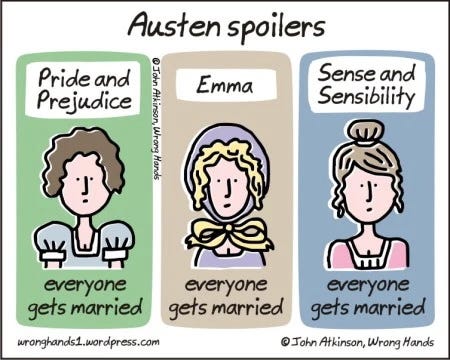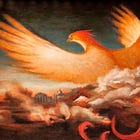Seven Swans a-Swimming
Vignette 10: Isabella Thorpe and Henry Crawford find Christmas at a New Year's Eve ball.
Friends, this is the final vignette in my series of ten Jane Austen Shorts and marks one year of my writing here on Substack. Thank you for being among my first 759 readers! If you’ve come upon this post by accident and like what you read, please subscribe to hear from me once a month.
This 10th vignette can be read on its own — or if you’d like to catch up on the previous nine, you can choose among them here. I heard from readers that they’d like to know what happens to Henry Crawford and Isabella Thorpe — so here’s the next installment! If you’d like to hear more — or if there are any other loose threads whom you’d like to see tie-the-knot — tell me in the comments, and I may start a Volume II of Jane Austen Shorts. Thanks for your encouragement, friends!
Without further ado, here’s “Seven Swans a-Swimming.”
Seven Swans a-Swimming
Vignette 10
“Henry! Where’s your drink? Get over here!”
Henry Crawford barely caught his name over the band. In the flashing lights of the ballroom, he turned to see a group of his old high school classmates gathered around a table near the dance floor. This was Henry’s first time attending the Apogee Town Club’s annual New Year’s Eve Fairy Tale Ball — and he laughed at how absurd his 34-year-old friends looked in their Prince Charming costumes. Not a member of this club, Henry had been invited as a celebrity to emcee the evening’s fundraiser for Atlanta’s children’s hospital. He smiled at his friends and raised a hand in acknowledgement as he finished with a group of women who had gathered around him.
“Have you done many period dramas before? The rake that you play in this new one is so cruel!” one woman was shouting above the band. “So different from the doctor in that hospital series. Which character is more like you, do you think?”
Another woman who imagined herself a provocateur interjected, “They both look the same with their shirt off — how different is one character from another, really.”
Henry eyed the second woman, dressed as a sexy villain of some sort, while answering the first. “There’s a bit of cruelty in all of us, don’t you think? It’s actually easy and fun to play the bad guy — because you get to act on your worst instincts and get away with it, right?”
“Is that right — I never thought about it that way before!” the first woman said, beaming up at Henry.
“So, Mr. Crawford, it’s less fun playing the good guy?” the second woman asked, raising her alluring shoulders, as the other ladies sparkled at him.
Henry knew he resembled Adonis in his tailored tuxedo and accepted that these women had all ogled him shirtless on multiple television series on many occasions. What they had never seen and could never appreciate was the most-exercised muscle in his body — the one that kept his eyes elevated to theirs instead of on their cleavage, tauntingly displayed under his view. Henry had never understood this mysterious test in which women both revealed their bodies and shamed men for looking at them. Any man who glanced at the exposed flesh received a poor grade: C for Creep. So he looked the provocative woman in the eye and gave her what she wanted: He smiled and winked. “No fun at all,” he said, and she seemed to billow under his (censored) admiration.
“Mr. Crawford?” A member of the staff spoke over the women’s heads. “Please excuse me. It’s twenty minutes ‘til midnight. Just wanted to make sure you have what you need before the countdown.”
“Thank you,” Henry said. “Please excuse me, ladies. I need to get ready. It was a pleasure talking with you.”
They all smiled and waved — the provocateur winked back — and Henry made his way toward the nearest exit from the ballroom. He played the part of emcee well with friendly smiles and waves for the club members and sympathetic eyebrow lifts for the waiters as he walked at the perfect speed, conveying purpose without panic. Everyone watched him, and no one stopped him — he congratulated himself on his masterful exit and headed down an atmospherically lit hallway looking for an empty room. A throng of women approached and would intercept him before he reached the men’s room, just in view — so he backed into a door that said “Staff Only” and hid in the service stairwell until they passed.
Fifteen minutes remained until the countdown, for which his convivial smile and raised glass were required on stage — plenty of time to take a breather if he could avoid friends and fans. He heard the women pass the door on their way to the ladies’ room.
One of them said, “Wasn’t that Henry Crawford? Where did he go?”
Another replied, “I wonder who he’ll end up with tonight. My money’s on Isabella Thorpe. She’s between husbands again, bless her heart.”
Another said, “Sandy, hush!” before the gossip continued in the inner sanctum of the powder room.
Henry rolled his eyes and sighed. Poor Izzy Thorpe — hadn’t she been through enough without having her name linked with his? He knew all the rumors about his high school friend — how she’d been engaged to a man whom she betrayed before the wedding 13 years before; how she’d then married a wealthy man whom she divorced to marry a wealthier one; how her affair (nevermind her husband’s) had led to a second divorce and a third marriage — to an ancient man of enormous fortune who had just died, leaving her millions. The last husband (and maybe the second?) had been a member of the Apogee Club, and Henry had wondered if she’d be there that evening. There was no sign of her yet. He had spoken to her only a few times since high school — the last time, at the St. Regis Hotel bar just a few weeks previously when he came off rather well, he believed1 — and had thought of her every day since.
He could still hear people milling around outside and checked his watch. Ten more minutes. Though lacking in club chairs, this hiding place would do as well as any to be alone before the next exertion — so he leaned into the corner, crossing his arms, and faced the stairwell. The Izzy Thorpe he knew in high school — without question, the most beautiful woman he had ever seen (and he’d seen some) — could have charmed any man to do anything. But he’d always thought her infamous career had developed out of desperation rather than a love of power or money. She was abandoned in every sense of the word — by her dead father, her alcoholic mother, jealous friends and bitter sisters who couldn’t approach her beauty, mothers at her school who should have welcomed her to their homes instead of turning a chipped shoulder. He’d watched it happen repeatedly in high school — his own sister Mary had been one of her jealous classmates — and knew that Izzy would eventually abandon her self-respect in an urgent pursuit of love and security.
He adjusted his shoulder against the wall and thought how he wanted to give her those things and shield her from gossip — but association with him would only stain her further. His career, much more sordid, hadn’t yet received the gloss of marriage. He had broken up a marriage, if that counted, and had a son with a childhood friend whose life he had derailed, and had participated in innumerable, forgettable couplings, all splashed across the internet. It would not be kind to cast Izzy as his next fling, though that’s not how he thought of her — and no longer how he thought of himself.
The light on the upstairs landing was out, and a rustle in the dark above caused him to glance up where he saw a pale swan gliding down the stairs, the feathers whispering on the steps, until the figure saw him and paused, the masked face still in the upper twilight.
Henry would know that figure anywhere, and he allowed his eyes to appreciate the flattering curves of the costume, perfectly themed for the Fairy Tale Ball. She had won the Miss Georgia Scholarship at 18 years of age, back in 2010 when there had still been a swimsuit competition.
“Isabella Thorpe,” he said.
“Henry,” she said. “I heard you would be here tonight.” Isabella continued down the steps and stood opposite him. “It’s almost midnight. Don’t you have a job to do?”
“In a minute. Why would you, of all people, wear a mask? Let me see your face.”
She paused for a few seconds and then removed the white-feathered mask — revealing red, puffy eyes and poorly salvaged makeup, still runny from tears.
“Izzy,” Henry said in a low tone. “I’m sorry. Is it too soon for you to be here after your husband…?”
Her eyes swam with tears again at such unexpected sympathy, and she looked panicked for a moment, having nothing to stop them.
Henry fished a handkerchief out of his jacket pocket. “Here,” he said. “I sweat a lot when I perform.” He winced and said, “I mean, it’s not sweaty yet. It’s clean. I haven’t used it yet.” He exhaled and wondered how he could be a master of improvisation on stage and completely unravel with an audience of one. This one. He tried again. “Why are you crying? Can I do anything for you?” This was where having a sister came in handy.
“I have always depended upon the kindness of strangers,” she said in a deep Southern drawl, imitating Blanche DuBois, a role she had played opposite his Stanley Kowalski in high school. “Because the cruelty of friends hurts too much,” she said in her own voice.
“OK, I don’t like the Streetcar Named Desire reference. I am not Stanley Kowalski in this situation. Do you remember how traumatic it was to practice the scene before the off-stage rape? We were in high school! What were we doing performing that play? That is not a good memory. How about The Lion, the Witch and the Wardrobe instead? You made a beautiful Susan.”
“And you were my brother Peter.”
“Yeah… I was never able to muster brotherly feelings for you, which is why I thought of it just now.”
“It’s just all so meaningless, Henry,” she said, tearing up again.
“Theater? I don’t know — it’s had a role historically in changing culture. Look at —”
“No, Christmas! Christmas is so meaningless!”
“Oh! Christmas! OK.” He took a second to change gears. “That’s something I love about you, Izzy. There’s really no small talk — you just dive right into the deep end. ‘Christmas is meaningless.’”
She sniffed. “All the Christmas movies tell you it’s about family and friends and… and being together and finding love. But what if your family is dysfunctional?” She looked up at him and remembered the loss of both his parents in high school. “And what if your parents are gone?” she said.
This is not the right time to tell her that I’ve loved her for twenty years, Henry said to himself as he tried to focus on her crisis.
“And what if you have no friends — because no one who you want to be friends with likes you back? And what if you’ve been married three times and… and… no one has ever really loved you?” A tear coursed down her face, and she made further use of Henry’s handkerchief, blackening it with mascara.
Henry wondered when he could hold her without it being weird or taking advantage or breaking the feathers.
“And then everybody agrees, all at once at Christmas, to celebrate some promise of hope — and then nothing happens!” She spread her arms wide to expose the fakery. “And it’s over at midnight on December 25th! Moving on to the New Year! — and to New Year’s resolutions and another round of meaningless holidays! What are we even celebrating?” Her voice echoed in the stairwell and choked on a sob.
Henry pondered her words as his eyes traveled over the magnificent costume she wore, completely constructed of white feathers, artistically arranged in a swirl around her hips, layered artistically around her bosom — and he unexpectedly thought of his son’s mother, Maria Bertram. Not that Izzy reminded him of Maria — but that on Christmas Eve, Maria had told him something she’d learned at her church about Christmas. Something that applied here. Something about swans.
He quickly counted the dates on his fingers and said, “Izzy, there is meaning. I just heard about this last week, and you’ll love it — Christmas doesn’t end on the 25th. Christmas Day is only the First Day of Christmas. Today, December 31st, is the Seventh Day of Christmas.” He started humming “The Twelve Days of Christmas.”
Izzy sniffed. “So, what is today? Seven maids a-milking?”
“No,” Henry said. “Seven Swans a-Swimming.”
Izzy looked up at him in surprise.
“And it’s not just an annoying, repetitive song. The seven swans represent something important. My friend said that the number stands for… the seven gifts of the Holy Spirit… which are different from the Fruits of the Spirit, and I’m not sure why… and I don’t remember what the gifts are, but they’re something about compassion and encouragement… I dunno — but they’re good, and they’re gifts that last all year round.”
“And what do the swans mean?” Izzy asked, suspicious of what he was selling.
“Grace. And Beauty. Gifts that are already yours. And the water the swans are swimming in stands for… cleansing. Renewal. Like — like living water, my friend said, or… or love that never runs out. And —” Here Henry relied upon his improvisational skills. “It’s important that you are dressed as a swan today. Because all of this meaning… is for you.”
“But I didn’t know that today was ‘seven swans a-swimming!’”
“No, you didn’t. But then — the meaning of Christmas doesn’t come from us.”
Izzy had no answer for that and considered in silence.
As Henry watched her, he asked himself, Who could befriend this woman? Would his sister Mary finally be mature enough more than a decade after high school to be kind to a prettier woman? His childhood friend, mother of his son, returned to mind. She had just done the unthinkable by including him in her family’s Christmas Eve celebration, allowing him to have a relationship with his son, forgiving him for his part in her rewritten life.2 If she could do all that, she wouldn’t judge Isabella Thorpe. Maria Bertram might be the perfect friend for Izzy.
The door to the stairwell opened and a head poked inside. “Oh, thank God!” the staff member said. “Mr. Crawford, I’ve been looking for you everywhere! There’s literally two minutes until the countdown. You’ve got to get out there!”
“Thank you! I’ll be right there. Please give me a moment,” Henry said.
The staffer stared at him and said, “No, really. It’s like a minute-and-a-half now.”
“You go now, and I will be there for the countdown. Thank you,” Henry said firmly.
The staffer withdrew his head, nostrils flaring.
“Izzy,” Henry said quickly, “Would you come to dinner with me next week to meet an old friend of mine and her fiancé? I just met him on Christmas Eve. They are… remarkable people, and I know they would love to meet you. I think you’d like them, too. Real friends are hard to come by — and I think she’s… real-friend material.”
“Weren’t you with the Bertrams on Christmas Eve?”
Henry felt caught, though he wasn’t sure why.
“I follow your sister’s Instagram feed,” she said in response to his surprised look.
“Yes, I got to spend Christmas Eve with our oldest friends — and my son,” he added.
“I assume you’re referring to Maria Bertram. Is she the one who told you all this about the swans and Christmas?”
Again, Henry sensed deep waters he could not yet fathom. “Yes, I am. She is.”
“Let me make sure I understand: did you just invite me on a double date with the mother of your love-child?” she asked.
Henry paused, plumbing the depth of the problem and considering the potential dangers of that friendship. “Yes,” he said.
Izzy folded the handkerchief and handed it back to him.
“Thank you, Henry,” she said. “I’d love to come.”
For this story, read “Resurgens.”
For this story, read “Paradox.”
Find Jane Austen’s characters in her novels:
Henry Crawford in Mansfield Park
Isabella Thorpe in Northanger Abbey
See you again on February 1st! Happy New Year!





This was so sweet. I’m going to have to go back and read the others. Your writing style is fantastic, it pulled me along!
The series has been so fun, and your creative mind a joy to see into!